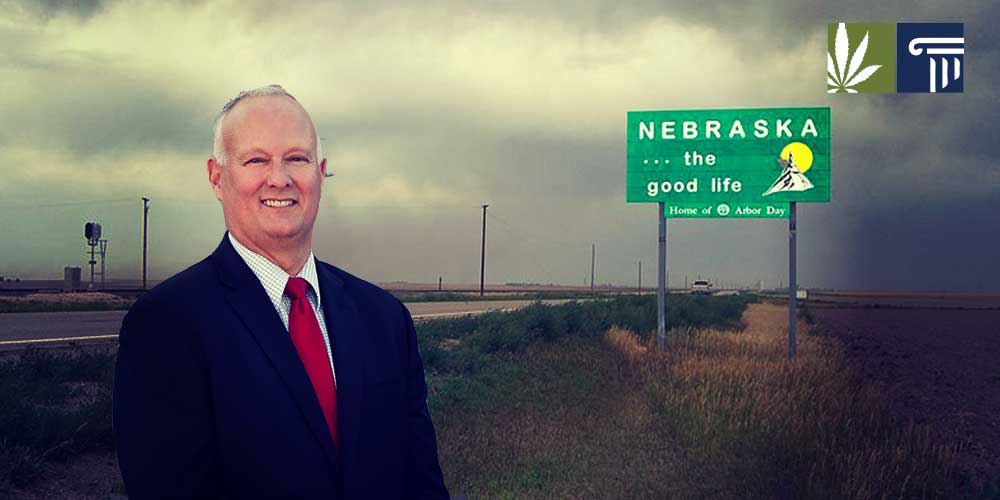Nebraska’s attorney general said that ongoing efforts in the state to establish a legal medical marijuana program would be preempted by federal law, making it unconstitutional.
Attorney General Doug Peterson’s (R) eight-page opinion concerns medical marijuana legislation introduced in Nebraska at the beginning of the year.
While other legal experts have come out against Peterson’s reasoning, the attorney general’s memo could affect the outcome of a separate ballot initiative underway by medical marijuana activists who are currently collecting signatures.
The secretary of state is responsible for certifying petition signatures, after which the ballot initiative moves to the attorney general who determines the wording of the ballot question and the explanation of its purpose. The attorney general will then “provide materials that explains the effect of a vote for or against the measure. These items will appear on the ballot.”
In the opinion, Peterson makes reference to the federal Controlled Substances Act (CSA), which categorizes marijuana as a Schedule I drug subject to the strictest controls. He writes that “Congress has not amended the CSA to remove marijuana from Schedule I, nor have considerable efforts to administratively reschedule marijuana been successful.”
The attorney general cites a 2005 U.S. Supreme Court ruling from California where patients argued for an exemption from federal interference for cultivating and possessing marijuana for personal use. The majority’s opinion in this case, for Peterson, makes clear that legalizing medical marijuana in Nebraska would be unconstitutional.
Here’s an extended extract of his opinion.
“It is the opinion of this office that the [Medical Cannabis Act] would suffer from the same legal infirmities as the California scheme in [Gonzalez v. Raich]. Notwithstanding the fact that state-level marijuana legalization schemes have spread in the recent (and discretionary) unwillingness by the federal government to civilly enforce the CSA against states, that exercise of discretion simply does not change the federal law that remains on the books and which Congress has steadfastly maintained.”
“Given Gonzales v. Raich, and given the text and legislative history of the CSA, there is no doubt that Congress intended the CSA to serve the purpose of making all manufacture, sale, and possession of regulated drugs illegal, except to the extent explicitly authorized by the CSA. Nothing about the federal government’s relaxed view of its enforcement obligations under the CSA changes the fact that Congress intended the CSA to prohibit the type of legalization proposed by the MCA.”
“In sum, we conclude that the MCA, by creating a state regulatory scheme that would affirmatively facilitate the cultivation, processing, wholesale distribution, and retail sale of federal contraband on an industrial scale, would frustrate and conflict with the purpose and intent of the CSA,” Peterson concluded. “Accordingly, we conclude that the MCA would be preempted by the CSA and would be, therefore, unconstitutional.”
What Peterson’s opinion doesn’t consider is the fact that since 1996 more than 30 states have legalized medical marijuana, and that the Supreme Court has yet to rule that any of these state legalization efforts were preempted by federal law.
As Sam Kamin, a professor at the University of Denver’s Sturm College of Law explains, the majority’s opinion in the Raich case was limited to saying that federal officials are able to enforce federal laws against individuals who are following state laws.
“Raich was not a case about preemption and the attorney general’s attempt to make it into one is misleading. He fundamentally misrepresents the Court’s holding in that case,” he said.
Kamin likens Peterson’s argument to that put forward by the attorneys general of Nebraska and Colorado in 2014 when they asked the Supreme Court to intervene in the marijuana laws of neighboring Colorado.
“The Court chose not to hear that case,” he said.
“Congress may not require the states to pass marijuana prohibitions or to keep their marijuana prohibitions on the books,” Kamin added. “Nothing in Raich says otherwise.”
But the implications of Peterson’s memo could be primarily political rather than legal, as it may embolden the federal government to make a preemption argument if Nebraska established a medical marijuana program and the Department of Justice took the step to challenge it for the first time. Such a move could encourage some voters to withdraw their support if the initiative were to make it to the state’s 2020 ballot.
Sen. Anna Wishart (D) is one of the sponsors of the Medical Cannabis Act (MCA) and sits on the committee pushing for the ballot measure. She rejects the attorney general’s opinion and says her legislation “is the product of hours of work with doctors, pharmacist, law enforcement, chambers of commerce and patients.”
“We took best practices from all of the states that have already legalized medical cannabis and put together what I would consider one of the best public health models in the country,” she wrote in a response to the attorney general’s opinion.
“Two-thirds of states have medical marijuana laws, the first enacted 23 years ago and no one has successfully challenged them. In fact, Congress has directed the DOJ to back off these programs.”
Sen. Adam Morfield (D), a cosponsor of the MCA, said the attorney general’s opinion is “no surprise” given his hostility to marijuana reform for years.
“Further, just as the legislature can reasonably regulate other constitutional rights such as speech, firearms and religion, they will be able to do the same if medical marijuana passes on the ballot,” he added. “Right now people are suffering needlessly in Nebraska and being treated like criminals because of the attorney general and others.”
Wishart remains confident that the committee pursuing the ballot measure will secure the required number of signatures, and that Nebraskans will finally have the opportunity to decide on the medical marijuana question.
“We are a country of dual sovereignty, complete with the 10th Amendment that affirms the rights of states,” she said.






